新概念英语117课讲义
新概念第一册117课

• While we were having breakfast, our little boy, Tommy, found two small coins on the floor. • • He put them both into his mouth. We both tried to get the coins, but it was too late. Tommy had already swallowed them!
② v. 吞并;侵吞
Our company was swallowed up by an American company last year. 我们公司去年被一家美国公司吞并了。
Key words&expressions
★ mouth
• • • • • •
n. 嘴 Open your mouth. 张开你的嘴。 eyebrows, eyes, nose,闭嘴(口) ears, mouth Shut your mouth. 眉毛,眼睛,鼻子,耳朵,嘴巴 from hand to mouth 勉强糊口 from mouth to mouth口口相传的 have a big mouth大嘴巴,嘴不严
Key words&expressions
★ coin n. 硬币 (note 纸币) toss a coin 掷硬币(打赌正面或反面) • Pay a person back in his own coin. 以其人之道还治其人之身。
later 1) adv. 后来,较迟地,较后地 e.g. three days later 三天后 e.g. He came later than usual. 他比平常来得晚。 2)adj. 较迟的,较后的,更近的。 e.g. Let‟s take a later train. 我们搭晚一点的火车吧。 drop v. (意外)掉落;使掉落 e.g. A drop in the bucket/ocean.
Lesson117(课件)新概念英语第一册
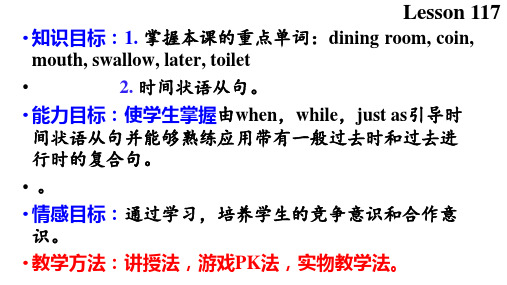
翻译下列句子。 • 1. 当我到达时,她正在做饭。 • When I __a_r_ri_v_e_d_, she_w_a_s___ _c_o_o_k_in_g_ a meal. • 4. 当我读书时,我妈妈正在做饭。 • _W__h_i_le____I was reading , • my mother __w_a_s_____ __c_o_o_k_i_n_g_____.
• A. him B. his
C. himself D. it
• (A) 4. Have you ever _______ Shenzhen?
• A. been to B. gone to C. went to
D. gone in
• (C ) 1. When he _______ I _______ a bath.
do housework
phone me from the office
一、选择题
• (C) 1. I _______ my pen everywhere but I couldn’t _______ it.
• A. looked for, found
B. found, looked for
• C. looked for, find
•。
• 情感目标:通过学习,培养学生的竞争意识实物教学法。
翻译下列句子。 • 1. 当我到达时,她正在做饭。 • When I ________, she______ _______ a meal. • 2. 当我读书时,我妈妈正在做饭。 • _________I was reading , • my mother _________ _____________.
While ... have breakfast, Tommy, find two small coins
(完整word版)新概念英语117课讲义

(完整word版)新概念英语117课讲义Lesson 117 Tommy’s breakfast 讲义重点一、本课重要单词dining room:饭厅,餐室;coin: n. 硬币;例:a silver coin 银币;mouth: n.嘴;例:Open your mouth. 张开嘴;Shut your mouth! (口语)闭嘴;swallow: v.吞…, 咽…;He swallowed the medicine with water.他把药和水一起吞下later: adv. 后来,较迟地,较后地;例:three days later 三天后see you later. 回头见toilet: n. 厕所;二、本课重要知识点1. While we were having breakfast, our little boy, tommy, found two small coins on the floor.当我们吃饭时,我们的孩子汤米在地板上找到了两枚小的硬币。
在本句中我们要掌握常见的while的用法:(1)意为“当…时候,在…期间”,引导时间状语从句。
例:While I was watching TV,the bell rang.当我正在看电视时,铃响了。
I lost my wallet while I was walking through the park.在我步行穿过花园的时候,我丢了我的钱包。
(2)意为“虽然,尽管”,引导让步状语从句。
例:While it was late,he went on working.虽然很晚了,但他还在继续工作。
While he is in poor health,he works hard.虽然他身体不好,但他还是努力工作。
2. We both tried to get the coins, but it was too late.我们都试图把两枚硬币拿出来,但太迟了。
新概念英语Lesson 117-118讲义

__________________________________
4.当他在刮胡子的时候刮伤了自己
__________________________________
5.当我正在花园工作的时候我妻子正在做饭
__________________________________
2.While we were having breakfast, our little boy, Tommy, found two small coins on the floor.
当我们正在吃早饭的时候,我们的小男孩Tommy在地板上发现了两枚硬币
3.When I was doing housework, my husband phoned me from the office.
★当引导瞬间性动作时必须用when
★当两个动作同时发生并且有对照的意思时用while
习题
翻译下列句子
1.当我正在吃早饭的时候有人敲门
__________________________________
2.当我正要离开房子的时候邮递员到了
__________________________________
4. put ….into….把….放进…..
5. try to do sth努力做某事
6. phone sb from the office从办公室打电话
7.have been to去过某处(已经回来)
have gone to去某处了(还没回来)
Sentences
1.When my husband was going into the dinning room this morning, he dropped some coins on the floor.当我丈夫正走进餐厅的时候把一些硬币撒在地板上了
(完整word版)新概念英语117课讲义
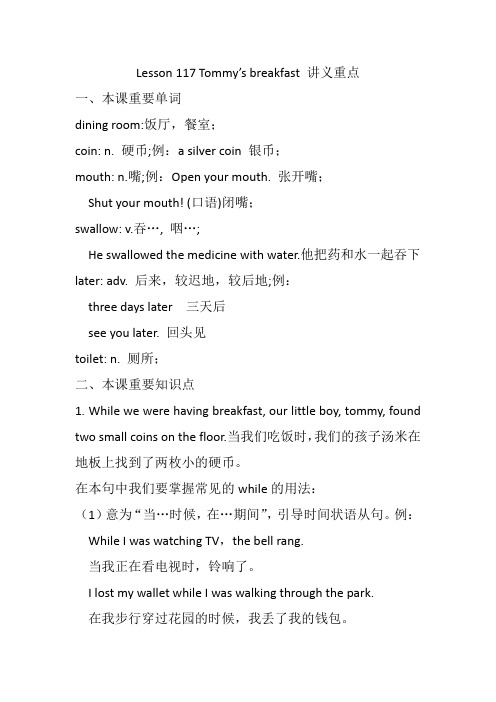
Lesson 117 Tommy’s breakfast 讲义重点一、本课重要单词dining room:饭厅,餐室;coin: n. 硬币;例:a silver coin 银币;mouth: n.嘴;例:Open your mouth. 张开嘴;Shut your mouth! (口语)闭嘴;swallow: v.吞…, 咽…;He swallowed the medicine with water.他把药和水一起吞下later: adv. 后来,较迟地,较后地;例:three days later 三天后see you later. 回头见toilet: n. 厕所;二、本课重要知识点1. While we were having breakfast, our little boy, tommy, found two small coins on the floor.当我们吃饭时,我们的孩子汤米在地板上找到了两枚小的硬币。
在本句中我们要掌握常见的while的用法:(1)意为“当…时候,在…期间”,引导时间状语从句。
例:While I was watching TV,the bell rang.当我正在看电视时,铃响了。
I lost my wallet while I was walking through the park.在我步行穿过花园的时候,我丢了我的钱包。
(2)意为“虽然,尽管”,引导让步状语从句。
例:While it was late,he went on working.虽然很晚了,但他还在继续工作。
While he is in poor health,he works hard.虽然他身体不好,但他还是努力工作。
2. We both tried to get the coins, but it was too late.我们都试图把两枚硬币拿出来,但太迟了。
在本句中我们要掌握all与both的用法及区别:“全部”。
新概念英语第一册117课课件45358教学教材
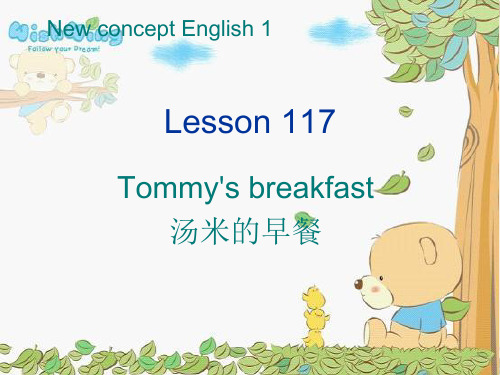
Theyห้องสมุดไป่ตู้were not watching TV. 3、疑问句:was/were + 主语+ 现在
分词
Was he writing a letter last night?
❖ 常用时间状语
When, while, a moment ago, from nine to ten last evening, at that time ❖ when既指时间点,也可指一段时间, while只指 一段时间,因此when引导的时间状语从句中 的动词可以是终止性动词,也可以是延续性动 词,而while从句中的动词必须是延续性动词。
o’clock last night.
Practice Time!
1. While she ___ TV, Penny ___ asleep.
A. watches, was falling B. was watching, fell C.was watching, was falling D. watch, fell KEY: B
7. Mike and I___(play) basketball at that time yesterday afternoon.
课文讲解
❖ When my husband was going into the dining room this morning, he dropped some coins on the floor.
❖ There were coins everywhere. We looked for them, but we could not find them all.
❖ everywhere 到处 ❖ look for 寻找(强调动作和过程) ❖ find 找到 (强调寻找的结果) ❖ 我找遍了任何地方都找不到我的钢笔。
新概念一117课精美课件

今天8:00am
他正在看书。
He is reading a book.
她正在看书。
She was reading a book.
昨天8:00am
过去进行时
1.构成
主语+was/were +现在分词
2. 过去进行时的基本用法
1)表示过去某一时间正进行的动作。 They were shaving at seven this morning. 今晨7点钟的时候他们正在刮胡子。
bedroom
kitchen
卧室
厨房
coin 硬币 note 纸币
Swallow
1)v. 吞……,咽……
He swallowed (up) the madicine with water.
他把药和水一起吞下。
2)n.燕子
later
1)adv. 后来,较迟地,较后地 three days later 三天后
Lesson 117 Tommy’s breakfast
dining room
饭厅
n.硬币
n.嘴 v.吞下 adv.后来
coin
mouth swallow lining room dining table
饭厅,餐室 餐桌
sitting room / living room 客厅
几天后他们要离开。
Homework: 上课:周日10:10--12:10 作业:1.预习119 2.初中卷子
Thank you !
sooner or later 早晚,总有一天
2)adj. 较迟的,较后的,更近的 in one’s later life 在晚年
toilet
n. 厕所,盥洗室
新概念英语第一册117课课件

Words and expressions
The text includes a variety of useful vocabulary and expressions related to learning English.
04
reading comprehension
Reading materials
Text
"The Olympic Games"
Background information
The history and development of the Olympic Games, the significance of the Games in modern society, and the role of the Olympics in promoting global peace and friendship.
Some examples of words and expressions are: "global language," "interconnected world," "essential," "communication," "learning curve," "fluency," "conversational skills."
01
Sorting out the content of the text
Topic of the text
The topic of the text is about the importance of learning English.
新概念英语第一册117课课件资料ppt

housework, my husband telephoned me from the
office.
earlier
早些时候
给某人打电话
该句为when 引导的时间状语从句
主句为一般过去时表示比较短晢的动作或事情
‘How’s Tommy ?’he asked . ‘I don’t know ,’I answered . ‘Tommy’s been to the toilet three times this morning , but I haven’t had any change yet .
but连接的并列句
has been to 去过某地 time 次数,(可数): three times > twice > once change 零钱 = coin Change 变化 双关语 yet 用于完成时的否定句和疑问句中。
Phrases
1. go into… 2. go out of… 3. look for
Later that morning ,when I was doing the housework ,Bill phoned me from
the office .
过去进行时表示
后来,晚些时候 later that morning,
从句
when I
w过as去正d 在o i进n行g的动t作he。
Focus on grammar
We looked for them, but we could not find them all.
While we were having breakfast, our little boy, Tommy, found two small coins on the floor.
新概念英语第一册117课 课件(共17张PPT)
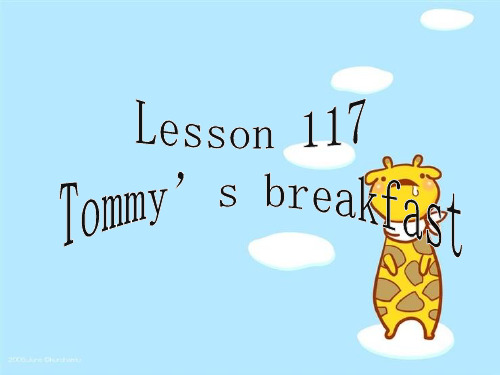
• 5. The train left when I was buying the tickets.
• 6. It rained heavily when I was driving to London.
A. is having B. have C. has D. was having
4. What ____ you ____from 7 to 9 yesterday ? A. were, doing B. did. do C. have, done
5.Look! Lily with her sister __ a kite on the playground.
shaving
cut
Exercise P239
• 1. He knocked at the door when I was answering the phone.
• 2. He came downstairs when I was having breakfast.
• 3. The phone rang when I was washing the dishes.
过去进行时VS现在进行时
结构
现在am/is/are+v-ing 过去was/were+v-ing
The students are drawing pictures now.
The students were drawing pictures when the teacher came in.
3.时间状语:
New words and expressions
dining room
新概念英语第一册117课课件

Language logic
Detailed description
Through sentence translation exercises, students can learn the language logic of English, improve the fluency and accuracy of English expression.
Vocabulary exercises
Summary words
Vocabulary application
Detailed description
Through vocabulary practice, students can learn how to apply newly learned vocabulary in practical contexts, deepening their understanding of the meaning of vocabulary.
indicates an action in the future or plan, often preceded by "to". For example, "I want to go to the park."
02
Analysis of key and difficult points
Key vocabulary and pd expanded knowledge
English listening and speaking training
Listening training
Provide listening materials related to the content of the text, such as English news, movie clips, etc., to help students improve their English listening skills.
新概念英语第一册117课课件
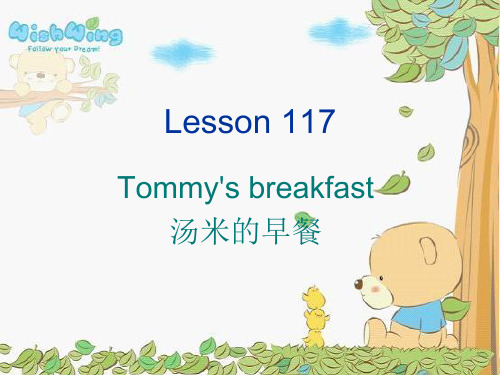
常用时间状语 When, while, a moment ago, from nine to ten last evening, at that time
when既指时间点,也可指一段时间, while只指 一段时间,因此when引导的时间状语从句中 的动词可以是终止性动词,也可以是延续性动 词,而while从句中的动词必须是延续性动词。
He
put them both into his mouth. We both tried to get the coins. But it was too late. Tommy had already swallowed them! put sth +介词短语 把…东西放在… 把书放在桌子上 Put the books on the desk. both表示“两个都…” 他们俩都想去法国。 They both want to go to France. 三者或三者以上用all 他们大家都幸福 They were all happy.
Lesson 117
Tommy's breakfast 汤米的早餐
Dining room(hall) 饭厅
Living room
起居室,客厅
Bedroom
卧室
Bathroom
洗浴室,卫生间
Kitchen
厨房
n. 硬币(可数名词) e.g. Every coin has two sides. 每个事物都有两面性。 mouth n. 嘴 e.g. Don‟t talk with your mouth full!
later
1) adv. 后来,较迟地,较后地 e.g. three days later 三天后 e.g. He came later than usual. 他比平常来得晚。 2)adj. 较迟的,较后的,更近的。 e.g. Let‟s take a later train. 我们搭晚一点的火车吧。 drop v. (意外)掉落;使掉落 e.g. A drop in the bucket/ocean.
新概念英语第一册117-118课ppt课件

最新版整理ppt
6
• 基本用法 • 1.表示过去某一时间正进行的动作。 • 这一特定的过去时间通常用时间状语,时间状
语从句或由上下文来表示。 • 今晨七点钟的时候他们正在刮胡子。
• They were shaving at seven this morning. • 当我进来时,她在给一个朋友打电话。
最新版整理ppt
10
• 3.leave, arrive, start, die 等用在过去进行时表 示“快要完成,即将…”。而用在一般过去时当 中则表示“己经完成”。
• 火车快要停了。
• The train was stopping. • 火车停了。
• The train stopped.
最新版整理ppt
• ③ v. 吞并;侵吞
• 我们公司去年被一家美国公司吞并了。
• Our company was swallowed up by an American
company last year. 最新版整理ppt
4
• later
• 1) adv. 后来,较迟地,较后地
பைடு நூலகம்• 回头见
• see you later.
• She was telephoning a friend when I came in.
最新版整理ppt
7
• 2.表示过去某一阶段一直在进行的动作。
• 他们昨天在等你。
• They were waiting for yesterday.
• 她去年在写一部小说。
• She was writing a story last year.
• everywhere 到处 • look for 寻找(强调动作和过程) • find 找到 (强调寻找的结果) • 我找遍了任何地方都找不到我的钢笔。
新概念英语第一册第117课课件讲课讲稿

117课 过去进行时练习: 一、仿照例句用所给 的词汇造句。
1. I, see him, he, cross the street I saw hi m while he was crossing the street. (He was crossing the street when I saw him.) A. the sun, shine, we, come out B. she, study at college, the war, break out C. she, work in a factory, the city, be liberate d (放) D. he, lose his pen, he, go sightseeing in th e city
阅读课文回答问题
What does the she mean by ‘change’ in the last sentence ?
再看一遍课文
When my husband was going into the dining room this morning
he dropped some coins on the floor.
定语从句的先行词是名词或代词;而同位语从句的先行词只能是 名词,而且仅限于idea,plan,fact,theory,promise,hope, news,doubt,truth,information,suggestion,question, thought,belief,conclusion等少数名词。
本课语法同位语
同位语,代表一个名词(或其它形式)对另一个名词或代词进行 修饰,限定或说明。同位语与被它限定的词的格要一致,并常常紧 挨在一起。
由两个或两个以上同一层次的语言单位组成的结构,其中前项与 后项所指相同,句法功能也相同,后项是前项的同位语其中常用 ‘and’连接。
新概念一L117-120单词讲义

Lesson 117 Tommy's breakfast★swallow ①v. 吞下,咽下Tommy had swallowed the coins.②v. 抑制,使不流露I tried hard to swallow my doubts. 我强忍着不露出怀疑的神色。
She swallowed a smile and sat there still.她忍住没笑,静静地坐在那里。
③v. 吞并;侵吞Our company was swallowed up by an American company last year.我们公司去年被一家美国公司吞并了。
Nazi Germany nearly swallowed up the whole Europe in World War II.第二次世界大战中,纳粹德国几乎吞并了整个欧洲。
dinning room(hall)饭厅living room bedroom storeroombalcony[ˈbælkəni]kitchen base room toilet厕所,盥洗室coin n. 硬币[语法]过去进行时概念: 1、在过去某个特定的时间正在进行或发生的动作。
2、当过去的一个动作发生的时候另外一个动作正在进行。
结构:主语+ was(were)+ doing S+ wasn’t(weren’t) +Ving Was(Were)+S +Ving?连接词:when 当……的时候;while 当……的时候(强调两个动作的同时进行)when和while大多数情况下可互换,当强调两个动作的同时进行和发生,只能用while。
just as 正当……at this time 这个时候I was walking in the street at this time last week.时间状语从句主句放前面,用连接词连接,时间状语从句放前面时,要用逗号隔开。
新概念一L117-118Tommy’s breakfast课件
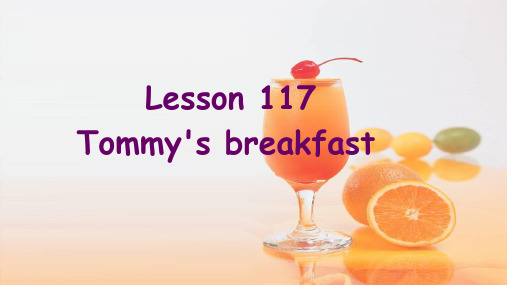
type letters What were you doing when he arrived?
I was typing letters when he arrived .
shave What were you doing when he arrived?
When he arrived I was shaving.
• have been to去过某地,已经回来了 • have gone to去过某地,还没有回来
have breakfast
knock at the door
What was she doing?
What happened?
Sshe was having breakfast. The man knocked at the door .
when
cook a meal What were you doing when he arrived? I was cooking a meal when he arrived When he arrived I was cooking a meal.
watch television What was he doing while you were cooking dinner?
While I was cooking the dinner, he was watching television.
clean his shoes What was he doing while you were cooking dinner?
wash the dishes What were you doing when he arrived? I was washing the dishes when he arrived .
新概念英语第一册117-118课讲义
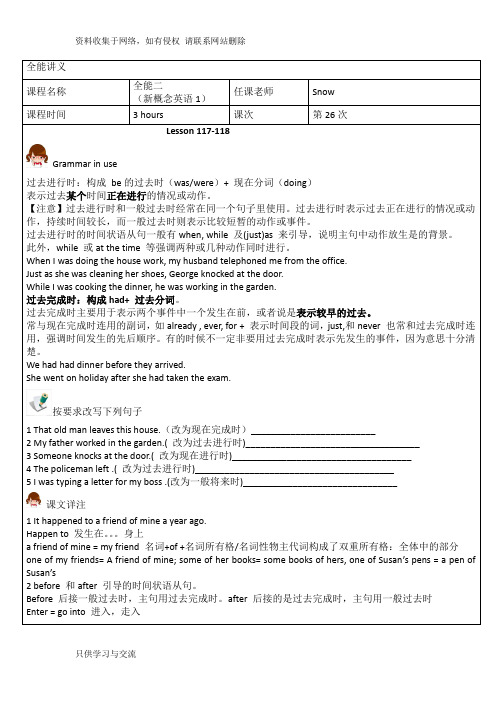
全能讲义课程名称全能二(新概念英语1)任课老师Snow课程时间 3 hours 课次第26次Lesson 117-118Grammar in use过去进行时:构成be的过去时(was/were)+ 现在分词(doing)表示过去某个时间正在进行的情况或动作。
【注意】过去进行时和一般过去时经常在同一个句子里使用。
过去进行时表示过去正在进行的情况或动作,持续时间较长,而一般过去时则表示比较短暂的动作或事件。
过去进行时的时间状语从句一般有when, while 及(just)as 来引导,说明主句中动作放生是的背景。
此外,while 或at the time 等强调两种或几种动作同时进行。
When I was doing the house work, my husband telephoned me from the office.Just as she was cleaning her shoes, George knocked at the door.While I was cooking the dinner, he was working in the garden.过去完成时:构成had+ 过去分词。
过去完成时主要用于表示两个事件中一个发生在前,或者说是表示较早的过去。
常与现在完成时连用的副词,如already , ever, for + 表示时间段的词,just,和never 也常和过去完成时连用,强调时间发生的先后顺序。
有的时候不一定非要用过去完成时表示先发生的事件,因为意思十分清楚。
We had had dinner before they arrived.She went on holiday after she had taken the exam.按要求改写下列句子1 That old man leaves this house.(改为现在完成时)_________________________2 My father worked in the garden.( 改为过去进行时)___________________________________3 Someone knocks at the door.( 改为现在进行时)____________________________________4 The policeman left .( 改为过去进行时)________________________________________5 I was typing a letter for my boss .(改为一般将来时)_______________________________课文详注1 It happened to a friend of mine a year ago.Happen to 发生在。
新概念英语第一册第117课完整ppt课件

阅读课文回答问题
What does the she mean by ‘change’ in the last sentence ?
精选ppt
再看一遍课文
精选ppt
When my husband was going into the dining room this morning
精选ppt
续的或同时发生的,那么主从句的动词都可用过去
进行时。
精选ppt
本课语法过去进行时
1.过去进行时由“主语+was/were+动词ing”构成 2.过去进行时的否定式由“主语+was/werenot+现 在分词”构成 3.过去进行时的疑问式由“was/were+主语+现在 分词”组成 句型 肯定句=主语+was/were+doing+其它 否定句=主语+was/were+not+doing+其它 一般疑问句问语=Was/Were+主语+doing+其它 答语:Yes,Iwas/were.或No,Iwasn't/were’t. 特殊疑问句=特殊疑问词精+选p一pt 般疑问句+其它
精选ppt
本课语法
1.look for,寻找(强调动作过程);find,找到(强调寻找的结 果)。 2.Tommy had already swallowed them! 汤米已经把硬币咽了下去 句中用了过去完成时形式 had swallowed。过去完成时用来表示过去 两个动作中发生在前的那个动作。显然,句中咽下硬币的动作发生在 夫妇俩能够把硬币从汤米手中抢过来之前。 3.later that morning,那天上午的晚些时候。 later是副词late的比较级。 4.any change change是个多义词,既有“零钱”的意思,也有“变化”的意思。此 处既可指“硬币”;也可指“情况的变化”。这是双关(pun /p)n/) 修辞法。
新概念117课 课件
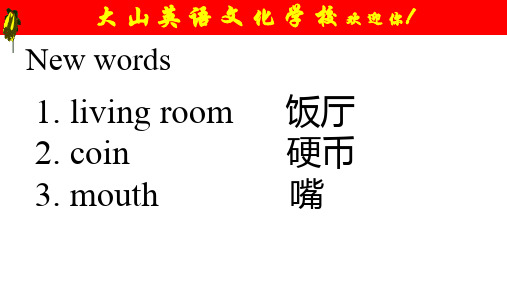
4.look for sb/sth. 寻找某人或某物(动作过程)
find ... 找到……
(强调结果)
大 山 英 语 文 化 Байду номын сангаас 校 欢 迎 你!
练习
1.My husband was going into the living room.
W__h__a_t _w__a_s_ _y_o_u_r_ husband _d_o_i_n_g_?
大 山 英 语 文 化 学 校 欢 迎 你!
New words
1. living room 2. coin 3. mouth
饭厅 硬币 嘴
大 山 英 语 文 化 学 校 欢 迎 你!
L117 Tommy's brekfast 汤米的早餐
1. When my husband was going into the dining room this morning, he dropped some coins on the floor.
W__e_re_ _y_o_u_ _sl_e_e_p_i_n_g_ at this time yesterday?
大 山 英 语 文 化 学 校 欢 迎 你! 2.drop sth. +介词短语 把某物掉到某处
3. everywhere =_h_e_r_e_ and _t_h_e_r_e__ 处处,到处
2. He dropped some coins on the floor.
W__h_e_r_e_d_i_d_ he _d_r_o_p__ _a_n__y_ coins?
大 山 英 语 文 化 学 校 欢 迎 你!
练习
3.There were coins everywhere.
- 1、下载文档前请自行甄别文档内容的完整性,平台不提供额外的编辑、内容补充、找答案等附加服务。
- 2、"仅部分预览"的文档,不可在线预览部分如存在完整性等问题,可反馈申请退款(可完整预览的文档不适用该条件!)。
- 3、如文档侵犯您的权益,请联系客服反馈,我们会尽快为您处理(人工客服工作时间:9:00-18:30)。
Lesson 117 Tommy’s breakfast 讲义重点
一、本课重要单词
dining room:饭厅,餐室;
coin: n. 硬币;例:a silver coin 银币;
mouth: n.嘴;例:Open your mouth. 张开嘴;
Shut your mouth! (口语)闭嘴;
swallow: v.吞…, 咽…;
He swallowed the medicine with water.他把药和水一起吞下later: adv. 后来,较迟地,较后地;例:
three days later 三天后
see you later. 回头见
toilet: n. 厕所;
二、本课重要知识点
1. While we were having breakfast, our little boy, tommy, found two small coins on the floor.当我们吃饭时,我们的孩子汤米在地板上找到了两枚小的硬币。
在本句中我们要掌握常见的while的用法:
(1)意为“当…时候,在…期间”,引导时间状语从句。
例:While I was watching TV,the bell rang.
当我正在看电视时,铃响了。
I lost my wallet while I was walking through the park.
在我步行穿过花园的时候,我丢了我的钱包。
(2)意为“虽然,尽管”,引导让步状语从句。
例:
While it was late,he went on working.
虽然很晚了,但他还在继续工作。
While he is in poor health,he works hard.
虽然他身体不好,但他还是努力工作。
2. We both tried to get the coins, but it was too late.
我们都试图把两枚硬币拿出来,但太迟了。
在本句中我们要掌握all与both的用法及区别:
“全部”。
both指两个人或物都、、、,(1)all , both, 表示“都”,
而all指三个或三个以上的人或物都、、、,例:
Both of us want to go. 我们两人都想去。
All of us should work hard.我们都应努力工作。
(2)both的反义词是neither, all的反义词是none。
neither 指“两者都不、、、”none指“三者或三者以上都不、、、”例:Neither of us is a doctor. 我们俩都不是医生。
None of the books is helpful.所有这些书都对人没有帮助。
三、重要语法:过去进行时
过去进行时表示在过去某一时刻或某一段时间内进行或发生的动作。
常与表示过去的时间状语连用。
(一)基本结构
过去进行时基本结构为:主语+was/were+动词的现在分词,例:
What were you doing when I rang you up?
我给你打电话时你在干吗?
I was having a bath at that time. 那时我在洗澡。
We were having supper when the phone rang.
我们正在吃晚饭时电话响了。
Was he playing basketball at four yesterday afternoon?
昨天下午四点他在打篮球吗?
(二)基本用法
过去进行时主要表示过去某时的一个动作正在进行。
例:He fell asleep when he was reading.
他看书时睡着了。
Mary was making a dress when she cut her finger.
玛丽做衣服的时候割破了手。
(三)句型转换
(1)由肯定句转换成一般疑问句
在过去进行时做主句的情况下,由肯定句转换成一般疑问句只需要把was/were提前即可。
例:
We were having supper when the phone rang.(转换成疑问句)我们正在吃晚饭时电话响了。
Were you having supper when the phone rang?
电话铃响了的时候你们正在吃饭吗?
Mary was making a dress when she cut her finger. (转换成疑问句)
玛丽做衣服的时候割破了手。
Was Mary making a dress when she cut her finger?
玛丽是在做衣服的时候割破了手吗?
(2)由肯定句转换成否定句
在过去进行时做主句的情况下,由肯定句转换成否定句只需要在was/were后边加not即可。
例:
We were having supper when the phone rang.(转换否定句)我们正在吃晚饭时电话响了。
We were not having supper when the phone rang.
电话铃响的时候我们没有正在吃饭。
(四)标志词:
过去进行时标志词一般为过去的某一个具体的时间,例:last短语:last week; last night; from nine to ten last evening; yesterday短语:yesterday morning;yesterday afternoon;at that time:在那时;等等。
